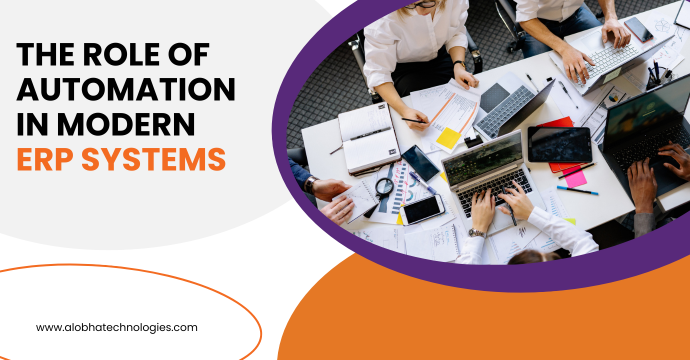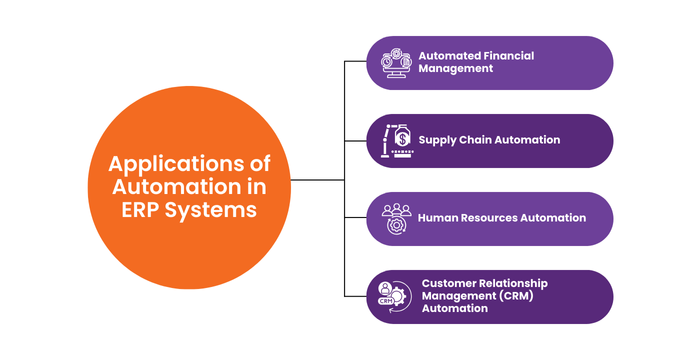
In today’s fast-paced business environment, staying competitive requires more than just efficient processes; it demands intelligent, automated solutions that streamline operations, enhance productivity, and reduce human error. Enterprise Resource Planning (ERP) systems have become a cornerstone for businesses aiming to integrate various functions across their organization.
However, the role of automation in modern ERP systems is what truly drives innovation and efficiency. This blog explores how automation is transforming ERP systems and why it’s essential for businesses aiming to thrive in the digital age.
The Evolution of ERP Systems
ERP systems have come a long way from their inception in the 1960s when they were primarily used for inventory management. Today, ERP systems integrate a wide range of business processes, including finance, human resources, supply chain management, and customer relationship management.
The primary objective has always been to unify these processes into a single system, thereby ensuring data consistency and operational efficiency.
However, with the rapid advancements in technology, particularly in the fields of artificial intelligence (AI) and machine learning (ML), ERP systems have evolved to include automation as a core feature.
This evolution is not just a trend; it’s a necessity in an era where data-driven decisions and real-time responses are critical for business success.
What is Automation in ERP Systems?
Automation in ERP systems refers to the use of technology to perform tasks that were traditionally done manually. This can include automating routine tasks such as data entry, invoice processing, and report generation, as well as more complex processes like predictive analytics, demand forecasting, and supply chain optimization.
By automating these tasks, businesses can significantly reduce the time and effort required to manage their operations, leading to increased efficiency and cost savings.
Key Benefits of Automation in ERP Systems
Increased Efficiency and Productivity
One of the most significant benefits of automation in ERP systems is the increase in efficiency and productivity. Automation eliminates the need for manual data entry, reduces the chances of human error, and allows employees to focus on more strategic tasks.
For example, automated invoice processing can reduce the time it takes to process payments, leading to faster cash flow and improved financial management.
Improved Accuracy and Data Integrity
Data accuracy is critical in ERP systems, as inaccurate data can lead to poor decision-making and operational inefficiencies. Automation ensures that data is entered consistently and accurately across all modules of the ERP system.
By reducing manual intervention, automation minimizes the risk of errors and ensures that the data used for decision-making is reliable.
Cost Reduction
Automation can result in substantial cost savings for businesses. By automating routine tasks, companies can reduce the need for manual labor, which in turn reduces labor costs.
Additionally, automation can help businesses identify inefficiencies and areas where resources are being wasted, further driving down costs.
Enhanced Decision-Making
Modern ERP systems equipped with automation and AI capabilities can analyze vast amounts of data in real time, providing businesses with actionable insights.
For example, automated analytics can help businesses identify trends and patterns in their sales data, enabling them to make more informed decisions about inventory management, pricing strategies, and customer engagement.
Scalability
As businesses grow, their operations become more complex. Automated ERP systems can easily scale to accommodate this growth, ensuring that processes remain efficient and that the system can handle increased data volumes and transaction loads.
This scalability is crucial for businesses looking to expand their operations without being bogged down by inefficiencies.
Applications of Automation in ERP Systems

Automated Financial Management
Automation in ERP systems can streamline financial management processes such as accounts payable, accounts receivable, and general ledger management.
Automated financial workflows reduce the time spent on manual data entry and reconciliation, allowing for quicker financial reporting and better cash flow management.
Supply Chain Automation
The supply chain is one of the most critical areas where automation can make a significant impact. Automated ERP systems can manage inventory levels, forecast demand, and optimize procurement processes in real time.
This reduces the risk of stockouts or overstocking and ensures that the supply chain operates smoothly and efficiently.
Human Resources Automation
In the realm of human resources, automation can handle tasks such as payroll processing, employee onboarding, and performance management.
This not only reduces the administrative burden on HR teams but also ensures that these processes are carried out consistently and in compliance with regulations.
Customer Relationship Management (CRM) Automation
Automation in CRM modules of ERP systems can enhance customer service by automating tasks such as lead management, customer segmentation, and follow-up reminders.
This ensures that sales and marketing teams can focus on building relationships with customers rather than getting bogged down by administrative tasks.
Read More: Why Your Business Needs an ERP Software System: Benefits and Advantages
Challenges of Implementing Automation in ERP Systems
While the benefits of automation in ERP systems are clear, implementing automation is not without its challenges. One of the primary challenges is the complexity of integrating automation with existing systems. Businesses need to ensure that their ERP system is capable of supporting automation and that the transition does not disrupt ongoing operations.
Additionally, there is the challenge of managing change within the organization. Employees may be resistant to automation due to fears of job displacement or a lack of familiarity with new technologies. Businesses need to provide adequate training and support to ensure a smooth transition to an automated ERP system.
The Future of Automation in ERP Systems
The future of ERP systems lies in the continued integration of AI, machine learning, and automation. As these technologies advance, we can expect ERP systems to become even more intelligent, with the ability to predict and respond to business needs in real time. This will not only enhance operational efficiency but also enable businesses to be more agile and responsive to market changes.
Furthermore, the rise of cloud-based systems will make automation more accessible to businesses of all sizes. Cloud ERP systems offer the flexibility to scale automation capabilities according to the needs of the business, without the need for significant upfront investment in hardware and infrastructure.
Conclusion
Automation is no longer a luxury but a necessity for modern ERP systems. As businesses continue to face increasing pressure to operate more efficiently and make data-driven decisions, the role of automation in ERP systems will only become more critical. By embracing automation, businesses can unlock the full potential of their ERP systems, driving growth, reducing costs, and staying competitive in an ever-changing market.